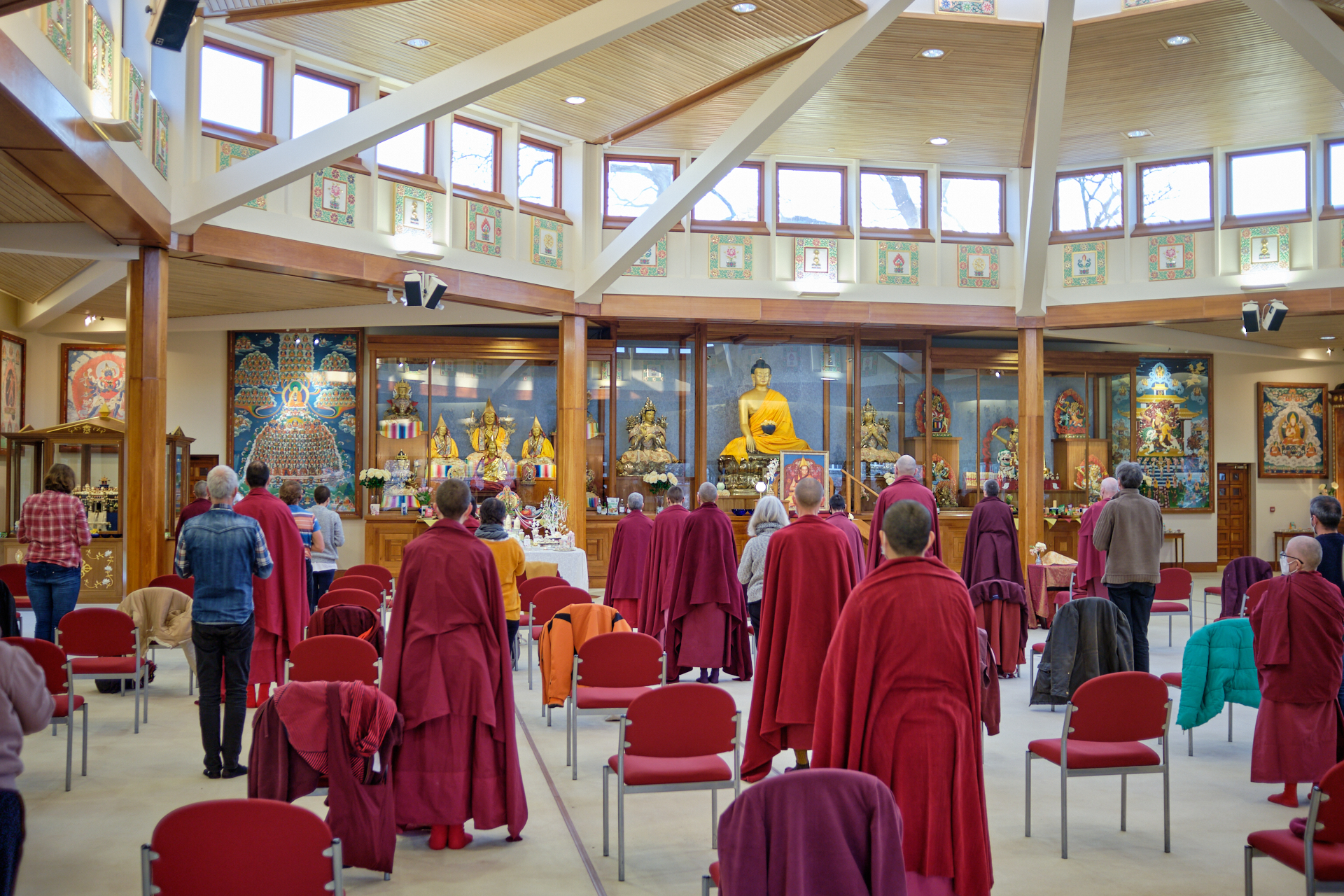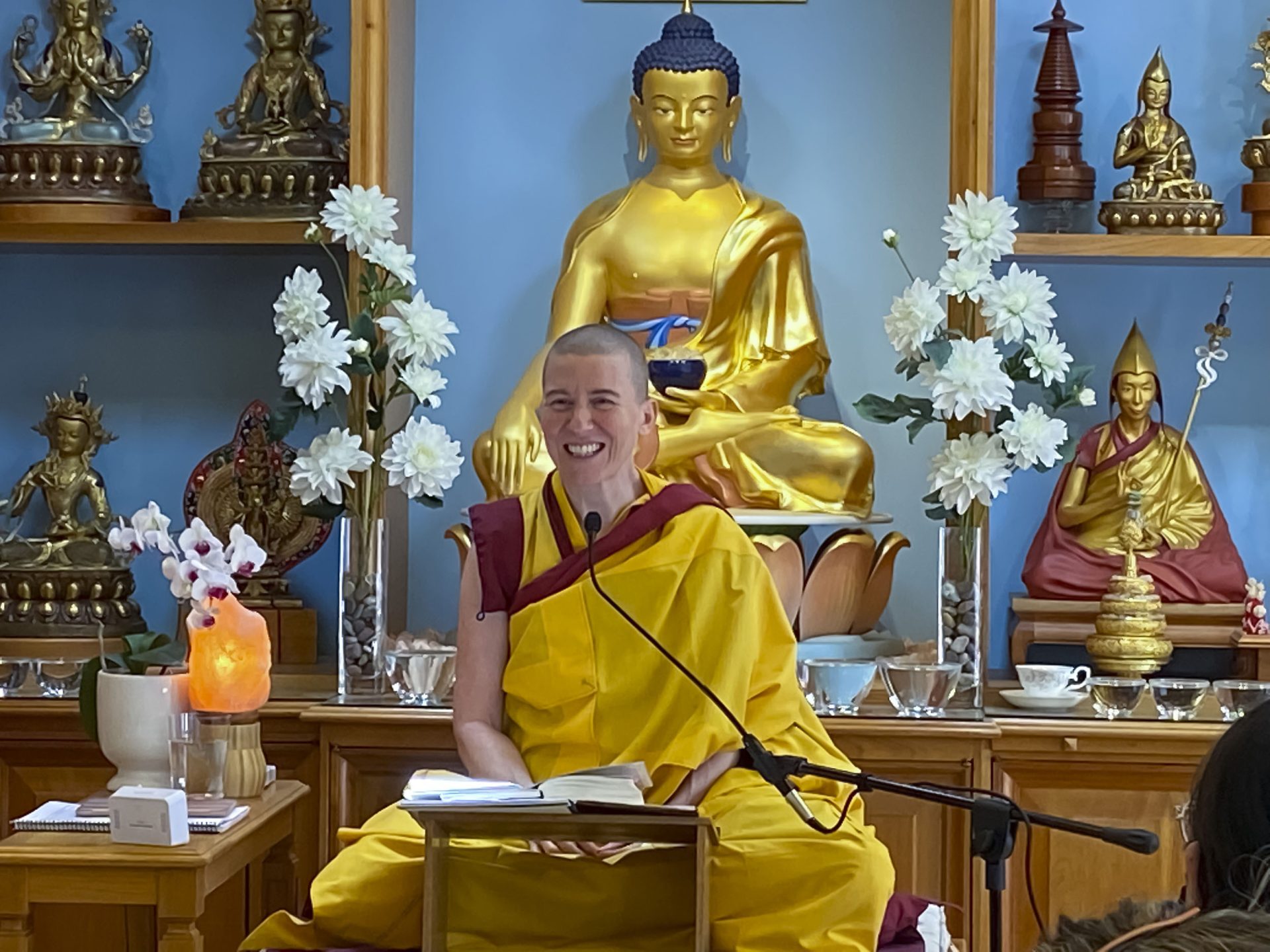Twelve New Films That Highlight the Best in Humanity
Greater Good shares the recipients of their annual “Greater Goodies” awards, highlighting films that showcase the best of human nature. The post Twelve New Films That Highlight the Best in Humanity appeared first on Lions Roar.

Greater Good magazine, an output of UC Berkeley’s Greater Good Science Center, recently announced the recipients of their annual “Greater Goodies” awards, highlighting films that showcase the best of human nature. This year, they gave the award to 12 films that “exemplify human strength and virtue.” Read on to see the winners.

Everything Everywhere All at Once swept this year’s Oscars ceremony with seven Academy Awards, including for Best Picture—and with its Asia-born stars and fractured storytelling, the movie in many ways it represents how much our society has changed over the course of the 21st century.
Indeed, all of the Best Picture winners of recent years have highlighted the struggles and wins of people marginalized by forces like racism and homophobia (Moonlight, 2016, as well as Green Book in 2018); xenophobia and sexism (The Shape of Water, 2017); poverty and inequality (both Parasite in 2019 and Nomadland in 2020); and disability (CODA, 2021).
Alongside the Oscars, we at Greater Good give “Greater Goodies” to films that highlight some human strength or virtue—and, once again, we have found those qualities in many characters who live at the margins of their societies and are struggling to claim their own identities and power. These are all movies that can help us learn about times, places, and people that might be unfamiliar to us—and yet may still help us to find our own paths through life.
The Everyday Awe Award: Apollo 10 1/2: A Space Age Childhood
What was it like to be a fourth grader living in a suburb outside of Houston, Texas, in 1968–69? If you’ve never wondered, don’t worry—neither had I. And yet Apollo 10 1/2 snuck up on me with its charm.
There’s no real plot to speak of in this low-key animated film, written and directed by Richard Linklater; it’s simply a year in one boy’s ordinary life, as extraordinary events unfold around him.
Stan (voiced as an adult looking back by Jack Black) plays Little League and rides his bike without a helmet and has a penchant for making up stories. His father is a penny-pinching NASA bureaucrat. Stan experiences the world through the TV he watches with his parents and many siblings, as that world is changing fast. It’s a time of wonder—of new kinds of music and new voices and new technologies and space exploration—and Stan is indeed filled with wonder. He may not be able to go to the moon himself, but he can fantasize about what it would be like for him to go.
That’s the phantasmagoric borderland through which Apollo 10 1/2 runs, where Stan’s childish quotidian life imaginatively intersects with the lives of people like astronauts. When Neil Armstrong’s first step on the moon is broadcast into Stan’s living room, he is probably asleep—and yet he still experiences the moment as a kind of dream.
“You know how memory works,” says Stan’s mom to his dad as they carry him to bed. “Even if he was asleep, he’ll someday think he saw it all.” Is that bad? Who knows? What matters is that we learn that feeling small in a vast universe can trigger awe instead of fear—and that awe can fire our imaginations and help us to feel connected with people around the world. — Jeremy Adam Smith
The Positive Masculinity Award: Close
Two young boys, Leo (Eden Dambrine) and Remi (Gustav De Waele), grow up in French-speaking Belgium as best friends. Their families live near each other, so the boys are almost always together. They make up spy games, laugh and play together, and enjoy frequent sleepovers, where they can share their private selves with each other.
Then middle school arrives, and their friendship is severely tested. They soon find that there is little acceptance among their peers for their close, intimate friendship, leading to misunderstanding, friction, and profound hurt.
The director, Lukas Dhont, has said his film was inspired by the research of Niobe Way, who studied the way boys form loving friendships when young, only to see them fade or be lost as they grow up. Dhont uses little dialogue, and his films features beautiful cinematography and exceptional acting. By putting a spotlight on societal messages around masculinity, including the need not to appear effeminate or gay, the movie illuminates how hard it is for boys to overcome social pressures—and how succumbing to them can exact a great price.
At several points in the film, we see Leo and Remi face tough choices about how to respond to bullying and amend their relationship in response. It doesn’t help that they don’t have the language to voice their feelings or understand the ramifications of trying to measure up.
Close is more tragedy than inspiration; the story warns us of the consequences of toxic masculinity. But there’s a positive alternative close at hand, and Close is a poignant reminder of how we, as a society, must allow boys to embrace their full humanity, be their authentic selves, and form loving friendships. — Jill Suttie
The Kindness Award: Everything Everywhere All at Once
As the name implies, Everything Everywhere All at Once is many things. It’s fantasy and science fiction and satire. It’s combatively funny and slapstick violent. It’s dense with sophisticated allusions to other films; it’s also unfailingly silly. It’s a mother-daughter drama, and a coming-out story, and an immigrant tale, and much more.
It’s also a fairly forceful argument in favor of kindness, love, empathy, and all the good stuff we cover here at Greater Good—voiced largely through the sweet character Waymond (Ke Huy Quan), husband of the fierce Evelyn (Michelle Yeoh). After an absurd series of twists, the two laundromat proprietors meet in a parallel universe where different choices led her to become an international film star and him to be a suave, wealthy businessman. In a key scene that pays tribute to the classic film In the Mood for Love, Waymond lays out his creed:
You think I’m weak, don’t you? You tell me that it’s a cruel world and we’re all just running around in circles. I know that. I’ve been on this earth just as many days as you. When I choose to see the good side of things, I’m not being naive. It is strategic and necessary. It’s how I’ve learned to survive through everything.
To which the other Waymond adds, in an artfully interleaved series of scenes: “Please, be kind. Especially when we don’t know what’s going on.” And then businessman Waymond says to his wife-from-another-life: “I know you see yourself as a fighter. Well, I see myself as one, too. This is how I fight.” — Jeremy Adam Smith
The Mindful Nature Award: The Elephant Whisperers
Filmed in a tiger reserve in South India, this Oscar-winning documentary short is the touching story of an orphaned baby elephant named Raghu. Separated from his herd and severely wounded by stray dogs, Raghu has a slim chance of survival until he meets Bomman and Bellie, whose unparalleled love, compassion, and devotion toward animals give Raghu a new life.
Things begin to change for Bomman and Bellie as they raise Raghu together, bringing them closer to each other. Shortly after they marry, the family faces a big challenge, leaving them in sorrow.
“Seeing an elephant, to us, is equivalent to seeing God,” explains Bomman. “Gods and elephants are one for me.” He later adds: “We take care of Raghu every single day, which in turn puts food on my plate. This is God’s presence in our life. Without him, we would be nothing.”
In a fast-moving and cutthroat world, this poignant story invites the audience to slow way down and consider the lives of the people and animals who make forests their home. The Elephant Whisperers humble us with their simplicity and love for the earth. — Aakash Arvind Chowkase
The In-Your-Face Authenticity Award: Fire Island
The setting of Fire Island is New York’s gay mecca for muscle-bound hookups and vacation one-night stands. Best described as a modern-day Pride and Prejudice for gay Asian Americans, this summer flick has all the trappings of a classic romantic comedy: charming lead characters, flirty banter, sexual tension, and chasing-through-the-airport grand gestures.
The narrative begins with four friends on a yearly pilgrimage back to Fire Island for a summer of flirty fun, frisky frolic—and possibly romance. Representing Elizabeth Bennett is the snarky and fiercely single Noah (played by Joel Kim Booster), who meets broody match Mr. Darcy in the form of Will (Conrad Ricamora).
Noah’s best friend, the sensitive and nerdy Howie (played by SNL comedian Bowen Yang), laments the group’s status as outcasts in a social scene where “no fats, no femmes, no Asians” is real but unspoken code.
Fire Island reveals the social struggles of a historically excluded group—the “Gaysians”—while subtly and humorously calling out homonormative biases and bullying within the community. As many positive psychology studies reveal, people are happier when they live lives that resonate with their true selves—and Fire Island is a wonderful reminder that everybody deserves a happy rom-com ending. — Aurelia Santos
Radical Self-Acceptance Award: Good Luck to You, Leo Grande
Good Luck to You, Leo Grande takes place mainly in a nondescript hotel room over the course of several transactional encounters between two people: retired religion teacher and widow Nancy (played by Emma Thompson), and an almost-too-handsome sex worker named Leo Grande (Daryl McCormack).
Nancy, it turns out, has never in her life experienced an orgasm. She looks to the professionally charming and sensitive Leo to help check that item off her bucket list—and yet, she seems determined to self-sabotage her experience.
The film runs like a play and is dialogue-heavy, slowly revealing the fascinating and flawed humanity of the two characters. You may find yourself feeling frustrated with Nancy, as she pokes inappropriately into Leo’s private life and wants to discuss what his mother thinks of his profession. She calls her own son boring and only reluctantly answers her daughter’s phone calls. But these difficult relationships reflect her deeper disappointment and dissatisfaction with herself, as it becomes clear that she’s denying her children the compassion she refuses to give herself.
“This is what you want,” says Leo. “It’s within reach. So why wouldn’t you take it?” It’s a poignant question we might each ask ourselves when we fail to move forward because of guilt, shame, and fear. Nancy’s journey reminds us that self-kindness and self-compassion can unlock the doors to happiness and facilitate human connection.
A recent study from Rutgers University shows when you’re warm and accepting of yourself, these feelings extend outwardly to others. It all begins with self-examination and a look in the mirror. Through our own gentle gaze, we can express self-love and compassion, allowing us to experience new heights of happiness and explore the depths of pleasure. — Aurelia Santos
The Solidarity Award: Lingui: The Sacred Bonds
Amina toils to raise her 15-year-old daughter, Maria, all alone in a humble neighborhood in Chad. To provide for herself and her daughter, she buys old tires, cuts them open, and salvages the metal inside for weaving baskets that she sells in the street.
We discover that Amina’s family banished her from their home when she became pregnant with Maria, and Maria’s father abandoned her, too. There are a few small joys in their lives, like a playful kitten and puppy. But even these moments are few and far between. When Maria becomes pregnant and is expelled from school, she tells her mother that she wants an abortion.
The problem is that abortion is both taboo and against the law. When Amina reacts with rage and fear, Maria runs away. It’s only because of the kindness of strangers that Amina and Maria are reunited shortly after.
Although despair is around every corner, Amina’s tenacity is fueled by her unwavering desire to give her daughter a better future. While the way forward is never clear, hope is rekindled by the chance meetings of other women with whom they find solidarity in secret. Amina and Maria find that they are not alone after all—and their perseverance and courage are bolstered by the compassion of those who have also known the same anguish.
This story has a universal quality that transcends time and place. It highlights the potential of empathy among women to create a sense of unity and mutual support that can overcome impossible circumstances. — Maryam Abdullah
The Purpose Award: Living
Mr. Williams (Bill Nighy) is a senior bureaucrat in the London Public Works Department, sometime in the early 1950s. When a trio of neighborhood women show up with a petition to turn a World War II bomb site into a children’s playground, Williams initially kills the proposal with inaction.
On the surface, Living is the story of how that playground ultimately gets built. But there’s a subtler story underneath the movie’s plot, about how facing death helps the saturnine Mr. Williams to find, in the end, some degree of happiness. This he does by first giving himself a purpose—and that purpose involves helping others.
Living was written by Nobel Prize–winning author Kazuo Ishiguro, based on the 1952 Japanese film Ikiru. Both films draw inspiration from “The Death of Ivan Ilyich,” the novella by Leo Tolstoy, in drawing unsentimental contrasts between a life of self-interest and a life of purpose and compassion. Ivan Ilyich never gets a chance to find purpose beyond the self, but Mr. Williams does. Even so, argues Living, we mustn’t imagine that our human-scale purposes make us larger than we actually are. As Mr. Williams writes in a letter to a younger colleague:
I have no wish to belittle our playground, but I put it to you that is was, all the same, a small thing. And that it will, before long, go the way of most small things. It may fall into disrepair, or be superseded by some grander scheme. To speak plainly, we cannot assume to have erected a lasting monument. Should there come days when it’s no longer clear to you to what end you are directing your daily efforts, when the sheer grind of it all threatens to reduce you to the kind of state in which I so long existed, I urge you then to recall our little playground and the modest satisfaction that became our due upon completion.
— Jeremy Adam Smith
Brave Heart Award: Marcel the Shell With Shoes On
“Guess why I smile so much? Because it’s worth it.”
The hybrid stop-animation live-action film Marcel the Shell With Shoes On gives us a lot of reasons to smile. That starts with the protagonist Marcel, a quick-witted hermit-crab shell with a single googly eye and pink sneakers on his feet. Within that one one-inch package, Marcel packs a big personality and an even bigger heart.
After his Airbnb housemate and amateur filmmaker (played by real-life director Dean Fleischer-Camp) puts his life online, Marcel (voiced by Jenny Slate) becomes a YouTube phenomenon. We delight in seeing Marcel navigate, with enthusiasm and sass, the challenges of living in a world not built for him. He uses a tennis ball as a roving car, honey to walk on walls, and “hardy” hairs to make rope. In those ways and more, Marcel takes the mundane and makes it extraordinary.
Underlying the film is Marcel’s backstory of grief after being separated from his family of shells one fateful night. It explains his inventive coping mechanisms and adaptive approach to life. Allied with filmmaker Dean and his one remaining relative, beloved Nana Connie (voiced by Isabella Rossellini), Marcel launches a search for his family that raises some surprisingly profound questions about social media and online “community.” As Nana Connie’s health deteriorates, Marcel faces the possibility of losing everything.
Every member of your family will find wisdom and whimsy in Marcel the Shell With Shoes On. What’s the biggest lesson from this small shell? When you find life overwhelming and change unstoppable, slow down, pause, and find your courage. — Aurelia Santos
The Community Award: Neptune Frost
What kind of movie is Neptune Frost? The shortest answer might be that it’s an Afrofuturist musical. But what does that mean?
I can tell you what it looks like: Burundi wraparounds decorated with microchips, a cape made of keyboards, psychedelic masks that resemble power grids, a tent covered in computer motherboards. After seeing Neptune Frost, I can tell you what it might sound like: chants and polyrhythms, French call and Kirundi response, drums and atmospheric drones, people singing in circles.
Some of you are going to be reminded of Ziggy Stardust and the Spiders from Mars. But don’t think of Bollywood or Hollywood musicals, with their elaborate productions and big stars. To anticipate what Neptune Frost will offer, imagine instead a group of people gently singing as they walk through a forest, or men chanting as they shovel rock. The music often doesn’t seem to be performed for you, the audience; the characters usually seem to be singing for themselves and each other. This is music for community, not consumption.
In exploring the intersection of African cultures with science and technology, the codirectors—American musician Saul Williams and Rwandan actor Anisia Uzeyman—don’t try to tell a straight story. It can be hard to tell characters apart as their appearances shift; the one named Neptune is played by two actors, Elvis “Bobo” Ngabo and Cheryl Isheja. They’re guided to another dimension by a common vision, and there they build a community that finds a way to strike back against “the Authority” that oppresses them, by melding dreams with the internet. As one character explains, “Technology is only a reflection of us.”
Neptune Frost isn’t for everyone; it’s too original for popularity. But if what I’ve described intrigues you, this movie could blow your mind. — Jeremy Adam Smith
The Perseverance Award: She Said
In She Said, two intrepid New York Times reporters, Megan Twohey (Carey Mulligan) and Jody Kantor (Zoe Kazan), help take down powerful Hollywood producer Harvey Weinstein for sexual assault and harassment. Though the outcome is well-known, the story of how it happened is an important, instructive one.
Twohey and Kantor show how difficult it is to break a story like this and the toll it takes on reporters’ personal lives. Their ability to communicate respect and empathy toward the women who survived their encounters with Weinstein, while still gently encouraging them to share their story with the world, is inspiring and a good lesson in mission-driven journalism.
As we discover what happened to these women, we learn how truly broken our system is, when it comes to finding justice for sexual abuse victims. The film also highlights the problems inherent in non-disclosure agreements, which compound their suffering while allowing abuse to continue unabated. “I signed,” says one victim describing her ordeal. “They gave us some money. And I felt completely broken.”
The movie doesn’t aim to tantalize us with morbid stories, but to show what heroism truly looks like, as we see the incredible courage exhibited by the women who shared their stories and the perseverance of the reporters who brought those stories to light. — Jill Suttie
The Bridging Differences Award: Stranger at the Gate
Richard “Mac” McKinney is the “stranger” of Stranger at the Gate, a short documentary film. He’s a Marine veteran of the wars in Afghanistan and Iraq who returns home to Muncie, Indiana, and decides to start planning an attack on a Muslim congregation.
Mac’s beloved stepdaughter Emily opens the film by describing him as someone who was always there for her. But we discover that Mac is capable of hate as well as love. During his 25-year military career, Mac saw an enormous amount of suffering and death. “As long as you can look at them as anything but human, you won’t have any problems,” explained one of Mac’s superiors when he went to them looking for help with coping.
Back in Muncie, Mac views the Muslims in his community as his enemies he wants to harm. Emily describes her dad becoming a “crazy man” after she told him about a Muslim classmate whose mom came to pick him up wearing a hijab. Mac is compelled to go to the Islamic Center to find “proof” for Emily of the danger they present to justify his murderous plan.
When Mac arrives at the Islamic Center, he is warmly met by the congregants who sense that he is troubled. Mac continues to be received with kindness during his subsequent visits. Within eight weeks, Mac shifts from planning to murder the people in the Islamic Center to feeling a sense of kinship. “You showed me what true humanity was about,” explains Mac.
“I couldn’t help it except to hug him and make him feel, not artificially, from my heart, that he is welcome and that he is part of us,” says Saber Bahrami, an Afghan refugee, family doctor, and cofounder of the Islamic Center. This incredible story could’ve easily ended in tragedy. Instead, it provides a testament of our capacity to bridge seemingly unreachable distances with strangers. — Maryam Abdullah
This article was originally posted on March 22, 2023 by Greater Good Magazine.

 ShanonG
ShanonG 
































